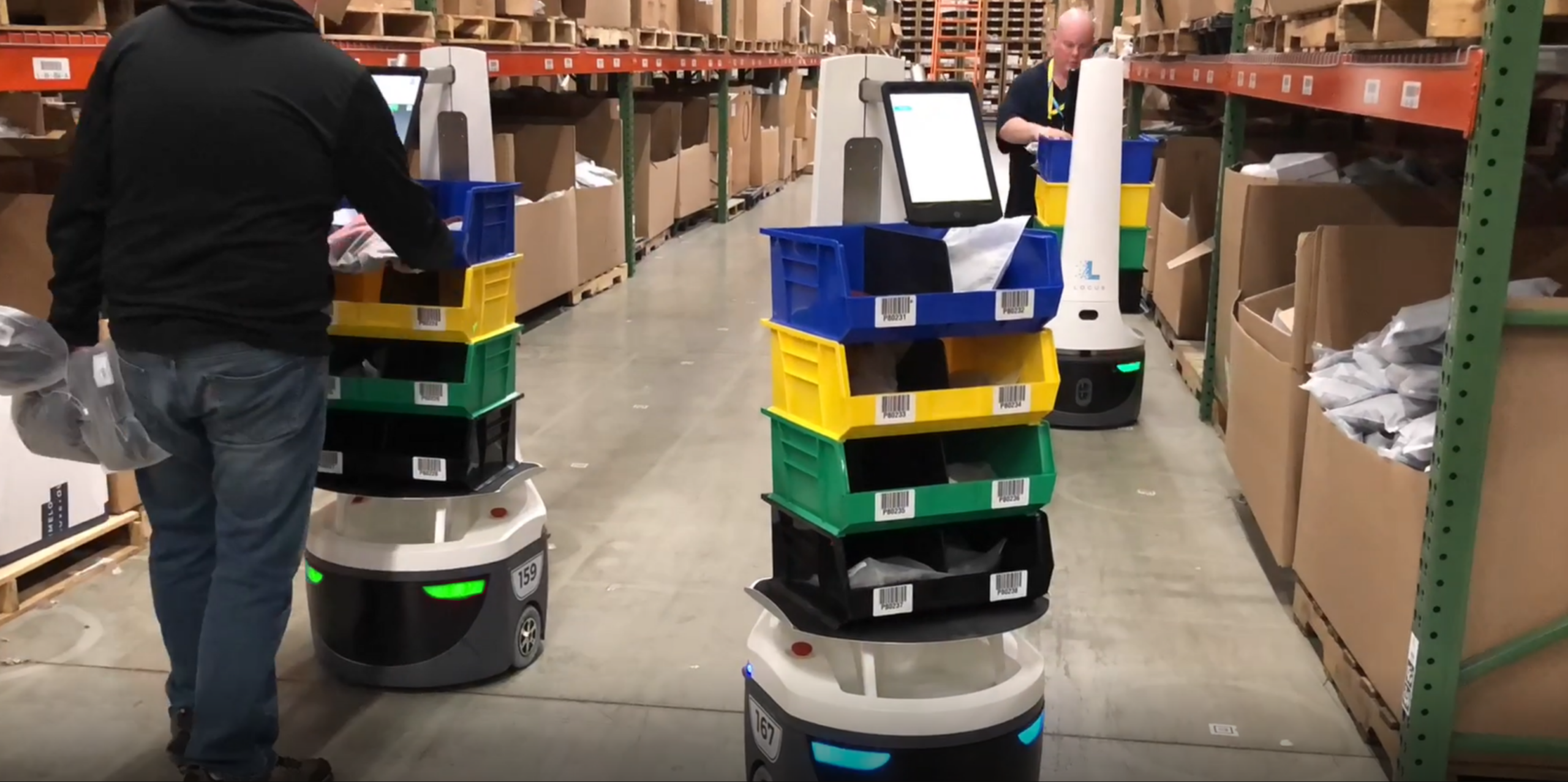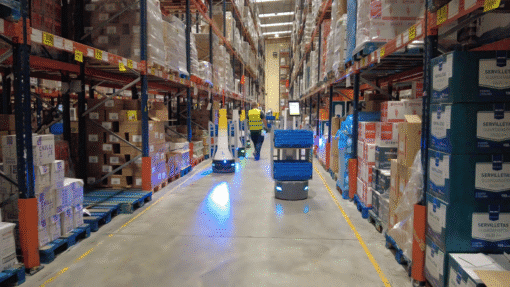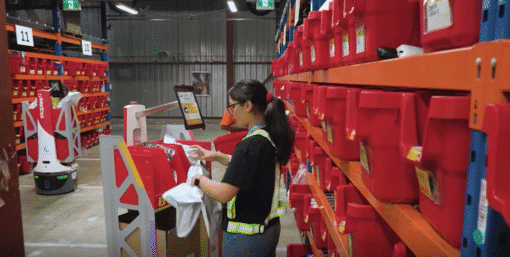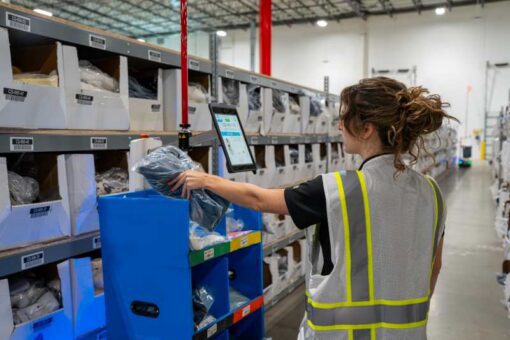WP: How to achieve 400 UPH with Locus Fast Pick
WP: How to achieve 400 UPH with Locus Fast Pick Download Now!
Warehouse Robots Demystified: It's Not as Hard as You Think
Mary Hart, Sr. Content Marketing Manager

Have you thought about automating your warehouse with robots, but you’re feeling overwhelmed by the prospect? You're not alone. Many warehouse managers across industries have shared your concerns about the complexity of warehouse robotic systems, the impact on their team, and the challenges of such a significant operational shift.
In this blog series, we’ll look at these worries head-on and reveal why automating your warehouse with robots is far more straightforward, beneficial, and easier than you might expect. For this first one, the focus is on the main fears about automating your warehouse with robots and counteracting each of those. Further blogs will go into each one separately in more depth.
Spoiler: None of those worries are true with autonomous mobile robots (AMRs) as your warehouse automation solution.
Top 5 Misconceptions About Warehouse Robotics
- Robots are too complex to implement
- Automation will disrupt operations
- AMRs replace human workers
- Robots aren’t flexible
- ROI takes too long
Seamless Integration, Minimal Disruption
Forget the sci-fi movie scenarios of robots causing chaos, like “Ex Machina” or even “I, Robot” with robots making a mess of things.
Yes, those are both movies, but the robotic reality can be chaotic depending on the form of automation you choose. Many fixed automation systems, for example, require some or all of an existing facility to shut down for weeks or even months while the solution is being installed. Consider how your customers would feel if their orders couldn’t go out for weeks or months.
There’s a better way. Warehouse robotics systems in the form of collaborative warehouse AMRs are designed for smooth integration into your existing operations. These solutions can be implemented without extensive facility renovations or lengthy shutdowns. In fact, some robotic systems can start improving warehouse efficiency in your facility from day one.
Plug-and-Play Simplicity
One of the most significant advantages of AMRs in warehouse automation is their plug-and-play nature. Unlike traditional automation systems that require extensive infrastructure changes, AMRs can be deployed with minimal alterations to your existing warehouse layout. These robots are designed to work within your current setup, navigating around existing shelves, pallets, and your associates.
The implementation process is surprisingly straightforward:
- Map your warehouse: This can often be done in a matter of hours using advanced mapping technology.
- Upload your inventory data: Most AMR systems integrate seamlessly with popular warehouse management systems (WMS).
- Train your associates: Basic training on working with automation typically takes just a few days; with some AMRs, it takes just minutes.
- Start operations: AMRs can begin assisting with tasks almost immediately after setup.
Technical Considerations for AMRs in Warehouse Operations
- Smooth WMS integration through APIs
- Reliable connectivity (WiFi/5G readiness)
- Minimal maintenance (battery swaps, software updates)
- Adaptability to different warehouse layouts (multi-site mapping)
Scale Up at Your Pace
Another common misconception is that warehouse robotics automation is an all-or-nothing proposition. In reality, automation in the form of AMRs can start small, with just a few robots handling specific tasks or zones, and gradually expand as you become more comfortable with the technology and see the benefits first hand – all the way to hundreds, or even thousands, of AMRs across multiple sites.
Warehouse robotics offer flexibility in managing capacity. With options like Robots-as-a-Service (RaaS), you can easily scale your robotic workforce up or down based on seasonal demands like peak or changing business needs. This adaptability ensures you're always optimally staffed without over-investing in fixed assets that may sit idle during slower periods.
Be Flexible for Changing Needs
When order volumes can change by the day, adaptability is key. Traditional automation systems can be rigid, making it difficult to adjust to changing market demands or seasonal fluctuations. Fulfillment automation powered by AMRs, on the other hand, offer the above scalability along with the flexibility to handle a variety of use cases.
These robots can be quickly reprogrammed to handle different tasks, work in new areas of your warehouse, or adapt to changes in inventory layout. This flexibility ensures that your automation investment continues to deliver value even as your business evolves.
Help, Not Replace, Human Associates
One of the biggest misconceptions about warehouse robotics is that they'll replace human workers. In reality, robots like AMRs are designed to work with your associates, not replace them. By handling repetitive, tedious tasks such as material transport, robots free up your team to focus on more complex, fulfilling work that requires human judgment and skills.
Many warehouses report that their associates quickly adapt to working with robots, often viewing them as helpful "colleagues" that make their jobs easier. This collaboration can lead to increased job satisfaction and opportunities for your associates to upskill and take on new responsibilities.
Here's how AMRs support your associates:
- Reducing physical strain: Robots handle heavy lifting and long-distance travel, reducing the risk of injury and fatigue among workers.
- Increasing productivity: By taking care of repetitive tasks, AMRs free up human workers to focus on more complex, value-added activities.
- Improving job satisfaction: Employees often report higher job satisfaction when working alongside robots, as their roles become more engaging and less physically demanding.
- Creating new opportunities: As automation increases efficiency, many warehouses find they can expand operations, creating new roles in areas like robot maintenance, data analysis, and customer service.
Improve Real-Time Visibility
Far from losing oversight of your operations, robotic systems often provide more detailed insights than ever before. Advanced analytics and user-friendly dashboards offer real-time visibility into key performance indicators, inventory levels, and operational efficiency. This wealth of data allows you to make informed, proactive decisions about inventory placement, staffing levels, and warehouse efficiency. The result? A continuously optimizing warehouse that becomes more efficient over time, often without any additional investment.
Rapid Return on Investment
The ease of implementation and immediate efficiency gains mean that AMRs often deliver a rapid return on investment (ROI). Many warehouses report seeing significant improvements in productivity and accuracy within weeks of deployment, with some achieving full ROI in as little as 6-12 months.
These quick returns are driven by:
- Increased picking speeds
- Reduced error rates
- Lower labor costs for repetitive tasks
- Improved inventory accuracy
- Enhanced worker safety (fewer accidents and less fatigue)
Warehouse Robotics is Easier Than You Think
Automating your warehouse with robots, particularly AMRs, is no longer a futuristic concept reserved for tech giants or massive corporations, although the “big guys” do indeed see the value of AMRs and are using them. It's a practical, accessible solution for warehouses of all sizes and across various industries.
The benefits are clear: increased efficiency, improved accuracy, enhanced worker satisfaction, and the agility to meet changing market demands. And the best part? Achieving these benefits is far simpler than most warehouse managers imagine.
AMRs from Locus Robotics are easy to implement, cost-effective, and designed to work seamlessly with your existing operations and workforce.
If you're ready to explore how warehouse robotics systems can transform your warehouse operations through fulfillment automation, it's time to take the next step. Book a live demo to see how AMRs can fit your warehouse robotics system today. Let’s talk!




